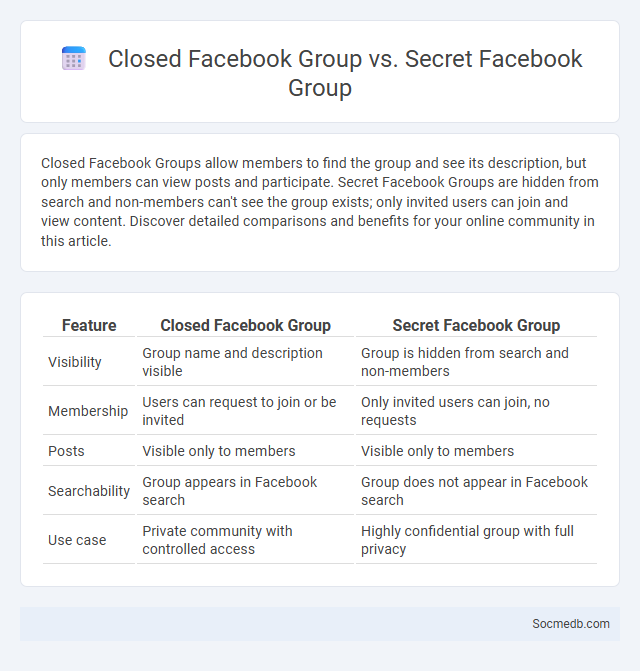
Photo illustration: Closed Facebook Group vs Secret Facebook Group
Closed Facebook Groups allow members to find the group and see its description, but only members can view posts and participate. Secret Facebook Groups are hidden from search and non-members can't see the group exists; only invited users can join and view content. Discover detailed comparisons and benefits for your online community in this article.
Table of Comparison
| Feature | Closed Facebook Group | Secret Facebook Group |
|---|---|---|
| Visibility | Group name and description visible | Group is hidden from search and non-members |
| Membership | Users can request to join or be invited | Only invited users can join, no requests |
| Posts | Visible only to members | Visible only to members |
| Searchability | Group appears in Facebook search | Group does not appear in Facebook search |
| Use case | Private community with controlled access | Highly confidential group with full privacy |
Introduction to Facebook Group Types
Facebook groups are categorized into three main types: public, closed, and secret, each offering different privacy levels and member access controls. Public groups allow anyone to see the content and join freely, while closed groups require admin approval for membership and restrict content visibility to members only. Secret groups provide the highest privacy, with the group hidden from searches and only accessible through invites.
What is a Facebook Group?
A Facebook Group is a dedicated online community within the Facebook platform where members can share content, engage in discussions, and collaborate around common interests or topics. These groups can be public, closed, or secret, allowing varying levels of privacy and membership approval. Facebook Groups facilitate targeted communication, making them ideal for businesses, hobbyists, and support networks to connect and build relationships.
Understanding Closed Facebook Groups
Closed Facebook Groups offer a private space where members can share content, engage in discussions, and build a community with controlled visibility and membership approval. Your participation in these groups ensures that posts are only visible to approved members, enhancing privacy and fostering a more focused, engaged interaction. Understanding the settings and purpose of Closed Facebook Groups helps you connect with like-minded individuals while maintaining control over your shared information.
Exploring Secret Facebook Groups
Exploring secret Facebook groups unveils exclusive communities where like-minded individuals share niche interests or sensitive information away from public view. These groups provide privacy settings that prevent outsiders from seeing group members or content, enhancing trust and candid discussions. You can leverage these hidden spaces to network, gather insights, or participate in focused conversations with complete confidentiality.
Privacy Settings Comparison: Closed vs Secret vs Public
Privacy settings on social media platforms allow you to control who can see your content, with Closed profiles limiting access to approved followers, Secret profiles making your presence and posts invisible except to invited users, and Public profiles allowing anyone to view your activity. Choosing between Closed and Secret profiles enhances your privacy by restricting visibility, whereas Public profiles maximize reach but expose your information to a broader audience. Understanding these distinctions helps you manage your online presence according to your desired level of privacy and engagement.
Membership and Access Control
Social media platforms implement robust membership and access control systems to regulate user interactions and protect sensitive data. Role-based access control (RBAC) ensures that users have permissions aligned with their account type, such as admin, moderator, or general member, enhancing security and content management. Advanced authentication methods, including two-factor authentication (2FA), further safeguard accounts from unauthorized access and maintain platform integrity.
Content Visibility and Searchability
Content visibility on social media platforms is driven by algorithms that prioritize relevance, engagement, and user interactions, making keyword optimization and hashtag use crucial for enhancing searchability. Leveraging meta-descriptions, alt text for images, and consistent posting schedules improves content discoverability across platforms such as Instagram, Twitter, and LinkedIn. Optimized profiles with relevant keywords and localized tags further boost search engine rankings, increasing organic reach and audience targeting efficiency.
Use Cases for Each Facebook Group Type
Facebook Buy and Sell Groups facilitate local commerce by enabling members to post items for sale and negotiate directly, boosting community-based transactions. Support Groups foster peer-to-peer assistance by creating safe spaces where individuals share experiences and advice around specific health, lifestyle, or professional challenges. Interest-Based Groups gather enthusiasts around shared hobbies, passions, or causes, promoting engagement through curated content, events, and discussions that deepen member connections.
Pros and Cons: Closed Groups vs Secret Groups
Closed groups on social media offer controlled access where members can see the group and its content but non-members cannot join without approval, enhancing privacy while fostering community engagement. Secret groups provide a higher level of confidentiality, as neither the group nor its content is visible to non-members, ideal for sensitive or exclusive discussions. However, closed groups may face challenges with member vetting, while secret groups can limit discoverability and growth potential.
Choosing the Right Facebook Group for Your Needs
Selecting the right Facebook group is crucial for maximizing engagement and gaining valuable insights tailored to your interests. Evaluate group activity, member expertise, and relevance to your specific goals to ensure congruency with your needs. Your effective participation in a well-chosen community enhances networking opportunities and resource sharing.
 socmedb.com
socmedb.com